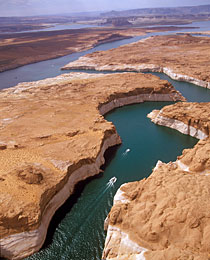
Lake Powell, showing the "bathtub ring" from falling water levels. Courtesy of Bureau of Reclamation.
One of climate change’s biggest impacts is on water systems. Unreliable water can impact both corporate bottom lines and jeopardize natural security, as two recent reports point out.
Climate change is changing precipitation patterns and intensity, increasing the incidence of droughts, floods, and erosion. These changes are making water supply and quality more difficult to obtain, affecting runoff and soil moisture, increasing water temperatures, decreasing snowpack and lake and river ice, threatening fish and aquatic species, and allowing saltwater intrusion and sea level rise. These changes are difficult to plan for, as past water patterns can no longer be used to predict the future. That uncertainty is problematic for businesses and can cause political strife, but some states and regions are taking proactive steps to avoid water trouble and will therefore be more reliable places to do business.
A recent report from the Natural Resources Defense Council ranked U.S. states based on how their governments are planning and preparing for the water–related impacts of a changing climate, including whether they have strategies to reduce the greenhouse gas pollution that contributes to climate change and whether they have adaptation plans for projected climate-related impacts. The report includes an interactive online map highlighting the unique water vulnerabilities each state faces and what each is doing — or not doing — to prepare. Climate modeling was drawn in part from a 2009 report (PDF) from the U.S. Global Change Research Program, but the NRDC report also considered state’s policies. It said:
Some states are leading the way in preparing for water-related impacts with integrated and comprehensive preparedness plans that address all relevant water sectors and state agencies. Unfortunately, other states are lagging when it comes to consideration of potential climate change impacts — or have yet to formally address climate change preparedness at all.
Ranked highest were Alaska, California, Maryland, Massachusetts, New York, Oregon, Pennsylvania, Washington, and Wisconsin. Of these, Alaska, California, Maryland, and Massachusetts had adaptation plans as well as greenhouse gas pollution reduction plans. All four except Alaska also had the more stringent greenhouse gas reduction target.
At the bottom of the heap were Alabama, Arkansas, Indiana, Iowa, Kansas, Missouri, Montana, North Dakota, Ohio, South Dakota, Texas, and Utah. These states have done no adaptation planning, according to the report. Arkansas, Iowa, Missouri, Montana, Texas, and Utah do have greenhouse gas pollution reduction plans, and Utah also has the more stringent greenhouse gas reduction target.
Meanwhile, another report (PDF) from the National Intelligence Council, released in February, warned of security threats due to water issues. The NIC is a government entity that incorporates information from a range of national security agencies, including the Central Intelligence Agency, the National Security Agency, the Federal Bureau of Investigation, and several others. The public version of the report did not list specific countries but only watersheds of concern (Nile, Tigris-Euphrates, Mekong, Jordan, Indus, Brahmaputra, and Amu Darya) that corresponded with nations that are strategically important to the United States, illustrating the intersections between water challenges and U.S. national security. The report said:
During the next 10 years, many countries important to the United States will experience water problems — shortages, poor water quality, or floods — that will risk instability and state failure, increase regional tensions, and distract them from working with the United States on important US policy objectives. Between now and 2040, fresh water availability will not keep up with demand absent more effective management of water resources. Water problems will hinder the ability of key countries to produce food and generate energy, posing a risk to global food markets and hobbling economic growth. As a result of demographic and economic development pressures, North Africa, the Middle East, and South Asia will face major challenges coping with water problems.
As agricultural accounts for 70 percent of the world’s freshwater use, the report suggested that improvements in water management, such as the increased use of drip irrigation, could help.
The NRDC report recommended that states implement “multiple benefit” strategies, such as green or porous infrastructure and water conservation and efficiency that address existing water challenges, while simultaneously building resilience to climate change impacts. On the other side of the coin, said the report, states should be cautious about investing in hard or gray infrastructure, such as sea walls, that is costly and inflexible as hydrologic conditions change and may actually slow effective adaptation.
The NRDC report also suggested that framing climate change vulnerability and preparedness planning in terms of emergency or risk management could be useful, as many state and municipal officials are already familiar with those concepts. And because watersheds often cross jurisdictions, broad partnerships will be needed for effective management.







